process.c File Reference
#include <glib.h>#include <signal.h>#include <stdlib.h>#include <stdio.h>#include <string.h>#include <unistd.h>#include <hal/libhal.h>#include <liberkeyb/erkeyb-client.h>#include "log.h"#include "busy.h"#include "conf.h"#include "connections.h"#include "display.h"#include "ipc.h"#include "hal.h"#include "process.h"#include "tasks.h"#include "xwindow.h"
Go to the source code of this file.
Functions | |
| static void | check_start_next (void) |
| static void | on_process_exit (GPid pid, gint status, gpointer data) |
| static gboolean | on_startup_completed_timeout (gpointer data) |
| static gboolean | start_process (proc_t *proc) |
| static void | check_respawn (proc_t *proc) |
| static void | on_reply_error (eripc_context_t *context, const eripc_event_info_t *info, void *user_data) |
| static void | post_process_startup (proc_t *proc, const char *application, gint window) |
| static proc_t * | create_process (const char *command, const char *working_dir, GCallback startup_callback, GCallback exit_callback, gint flags) |
| static void | destroy_process (proc_t *proc) |
| gboolean | process_add (const char *command, const char *working_dir, GCallback startup_callback, GCallback exit_callback, gint flags) |
| Add a process to the queue. The queue is served First In First Out. | |
| proc_t * | process_start (const char *command, const char *working_dir, GCallback startup_callback, GCallback exit_callback, gint flags) |
| Start a process without queuing. | |
| void | process_stop (proc_t *proc) |
| Stop a running process. | |
| gboolean | process_activate (const char *application) |
| Activate a running process (set to top). | |
| gboolean | process_activate_ctb () |
| Activate content browser (set to top). | |
| gboolean | process_startup_complete (const char *application, gint pid, gboolean is_multidoc, const char *ipc_service, gint window) |
| Call when application has finished starting. | |
| proc_t * | process_get_by_pid (GPid pid) |
| void | print_process_list () |
| proc_t * | process_get_by_name (const char *application) |
Variables | |
| static const gint | TIMEOUT_STARTUP_COMPLETED = 30 |
| static GSList * | g_proclist = NULL |
| static gint | g_process_pending_source = 0 |
Function Documentation
| static void check_respawn | ( | proc_t * | proc | ) | [static] |
Definition at line 492 of file process.c.
References check_start_next(), proc_t::command, destroy_process(), proc_t::exit_callback, proc_t::flags, proc_t::ipc_service, LOGPRINTF, proc_t::pid, PS_RESPAWN, proc_t::startup_callback, proc_t::state, STATE_DEVICE_STOPPING, STATE_IDLE, sys_get_device_state(), and WARNPRINTF.
Referenced by on_process_exit(), and on_reply_error().
00493 { 00494 GPid pid = proc->pid; 00495 00496 if (proc->flags & PS_RESPAWN) 00497 { 00498 LOGPRINTF("should respawn, new state STATE_IDLE"); 00499 WARNPRINTF("respawn application %s", proc->command); 00500 // reset to initial values 00501 proc->state = STATE_IDLE; 00502 proc->pid = 0; 00503 g_free(proc->ipc_service); 00504 proc->ipc_service = NULL; 00505 // don't use callbacks when respawning 00506 proc->startup_callback = NULL; 00507 proc->exit_callback = NULL; 00508 } 00509 else 00510 { 00511 LOGPRINTF("no respawn, remove from list"); 00512 destroy_process(proc); 00513 proc = NULL; 00514 } 00515 00516 // graciously close pid 00517 g_spawn_close_pid(pid); 00518 00519 if (sys_get_device_state() != STATE_DEVICE_STOPPING) 00520 { 00521 // start next process 00522 check_start_next(); 00523 } 00524 }
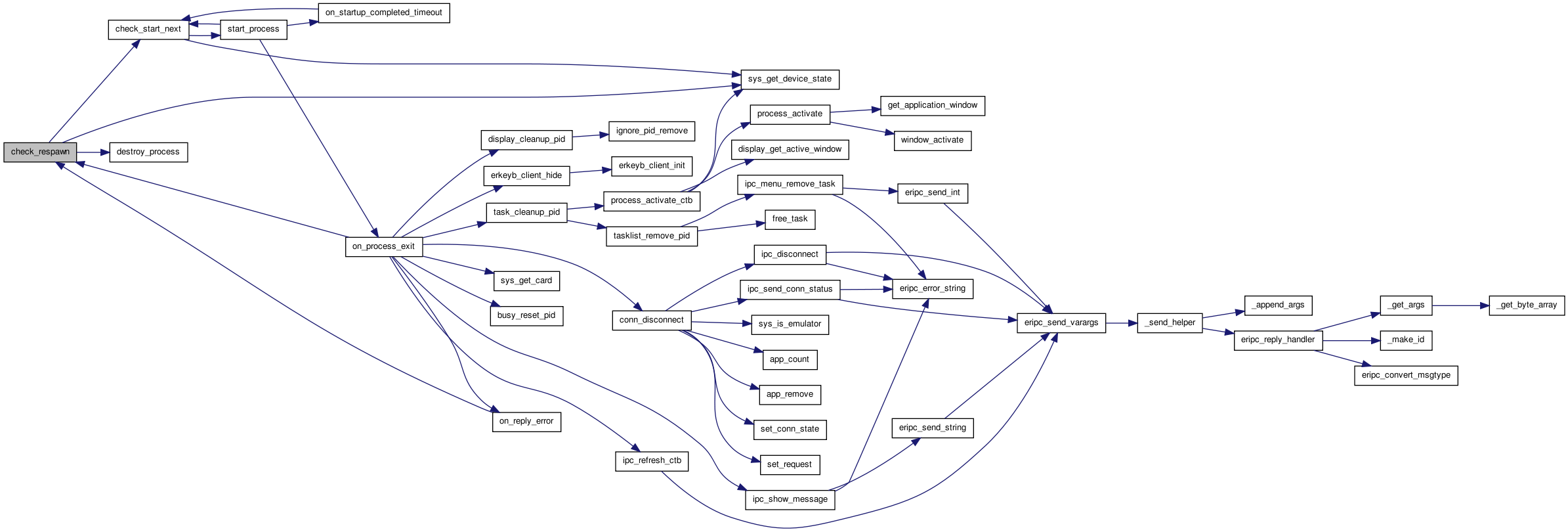

| static void check_start_next | ( | void | ) | [static] |
Definition at line 547 of file process.c.
References proc_t::command, proc_t::flags, g_proclist, LOGPRINTF, proc_t::pid, PS_WAIT_EXIT, PS_WAIT_STARTED, start_process(), proc_t::state, STATE_DEVICE_STOPPING, STATE_IDLE, STATE_RUNNING, STATE_STARTING, sys_get_device_state(), and WARNPRINTF.
Referenced by check_respawn(), on_startup_completed_timeout(), process_add(), process_startup_complete(), and start_process().
00548 { 00549 LOGPRINTF("entry"); 00550 00551 proc_t *cur_proc = NULL; 00552 GSList *proc_ptr = g_proclist; 00553 gboolean is_ready = TRUE; 00554 00555 if (sys_get_device_state() == STATE_DEVICE_STOPPING) 00556 { 00557 WARNPRINTF("device is shutting down, process not started"); 00558 return; 00559 } 00560 00561 while (proc_ptr) 00562 { 00563 cur_proc = (proc_t *) proc_ptr->data; 00564 00565 if (((cur_proc->state == STATE_STARTING) && (cur_proc->flags & PS_WAIT_STARTED)) || 00566 ((cur_proc->state == STATE_RUNNING) && (cur_proc->flags & PS_WAIT_EXIT))) 00567 { 00568 LOGPRINTF("wait for process %d to complete", cur_proc->pid); 00569 is_ready = FALSE; 00570 break; 00571 } 00572 00573 proc_ptr = proc_ptr->next; 00574 } 00575 00576 if (is_ready) 00577 { 00578 proc_ptr = g_proclist; 00579 00580 while (proc_ptr) 00581 { 00582 cur_proc = (proc_t *) proc_ptr->data; 00583 00584 if (cur_proc->state == STATE_IDLE) 00585 { 00586 LOGPRINTF("start next process: %s", cur_proc->command); 00587 start_process(cur_proc); 00588 return; 00589 } 00590 00591 proc_ptr = proc_ptr->next; 00592 } 00593 } 00594 return; 00595 }
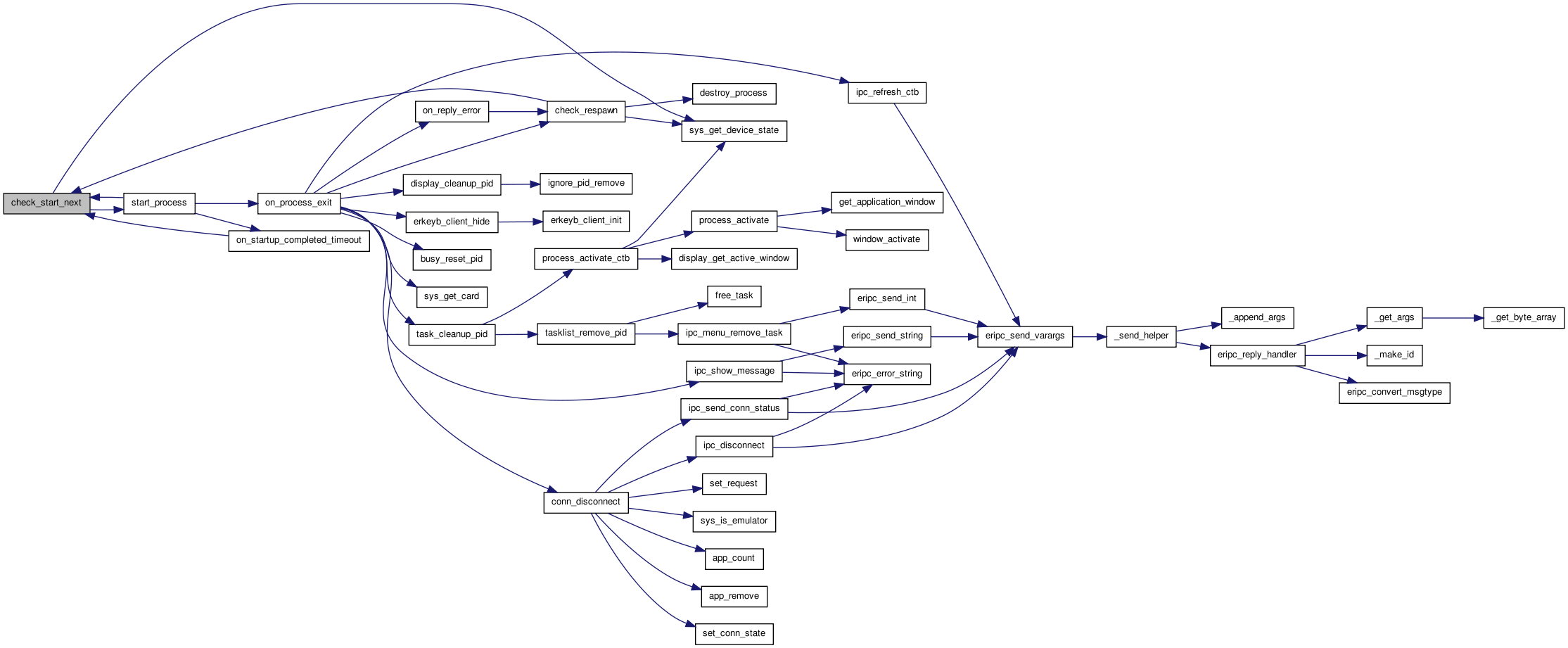

| static proc_t * create_process | ( | const char * | command, | |
| const char * | working_dir, | |||
| GCallback | startup_callback, | |||
| GCallback | exit_callback, | |||
| gint | flags | |||
| ) | [static] |
Definition at line 326 of file process.c.
References proc_t::command, ERRORPRINTF, proc_t::exit_callback, proc_t::flags, g_proclist, proc_t::ipc_service, proc_t::is_multidoc, LOGPRINTF, proc_t::pid, proc_t::startup_callback, proc_t::state, STATE_IDLE, and proc_t::working_dir.
Referenced by process_add(), and process_start().
00327 { 00328 LOGPRINTF("entry: %s, %d", command, flags); 00329 00330 proc_t *proc = g_new0 (proc_t, 1); 00331 if (!proc) 00332 { 00333 ERRORPRINTF("mem alloc failed"); 00334 return NULL; 00335 } 00336 00337 // init defaults 00338 // 00339 proc->command = g_strdup(command); 00340 proc->working_dir = NULL; 00341 if (working_dir) 00342 { 00343 proc->working_dir = g_strdup(working_dir); 00344 } 00345 proc->ipc_service = NULL; 00346 proc->pid = 0; 00347 proc->is_multidoc = FALSE; 00348 proc->flags = flags; 00349 proc->startup_callback = startup_callback; 00350 proc->exit_callback = exit_callback; 00351 proc->state = STATE_IDLE; 00352 00353 // add to list 00354 g_proclist = g_slist_append(g_proclist, proc); 00355 00356 return proc; 00357 }

| static void destroy_process | ( | proc_t * | proc | ) | [static] |
Definition at line 360 of file process.c.
References proc_t::command, g_proclist, proc_t::ipc_service, and proc_t::working_dir.
Referenced by check_respawn(), and process_start().
00361 { 00362 // remove from list 00363 g_proclist = g_slist_remove(g_proclist, proc); 00364 00365 // free memory 00366 g_free(proc->command); 00367 g_free(proc->ipc_service); 00368 g_free(proc->working_dir); 00369 g_free(proc); 00370 proc = NULL; 00371 }

| static void on_process_exit | ( | GPid | pid, | |
| gint | status, | |||
| gpointer | data | |||
| ) | [static] |
Definition at line 374 of file process.c.
References busy_reset_pid(), check_respawn(), proc_t::command, conn_disconnect(), display_cleanup_pid(), erkeyb_client_hide(), ERRORPRINTF, proc_t::exit_callback, proc_t::flags, g_process_pending_source, ipc_refresh_ctb(), proc_t::ipc_service, ipc_show_message(), LOGPRINTF, on_reply_error(), proc_t::pid, PS_RESPAWN, proc_t::state, STATE_CARD_INDEXING, STATE_STARTING, sys_get_card(), task_cleanup_pid(), and WARNPRINTF.
Referenced by start_process().
00375 { 00376 LOGPRINTF("entry"); 00377 00378 #if (WARNING_ON) 00379 // see signal.h and man 3 waitpid 00380 const char *status_text[] = { "", "SIGHUP", "SIGINT", "SIGQUIT", "SIGILL", 00381 "SIGTRAP", "SIGABRT", "SIGBUS", "SIGFPE", 00382 "SIGKILL", "SIGUSR1", "SIGSEGV", "SIGUSR2", "SIGPIPE", 00383 "SIGALRM", "SIGTERM", "SIGSTKFLT", "SIGCHLD", 0}; 00384 if (WIFSIGNALED(status)) 00385 { 00386 WARNPRINTF("pid %d was terminated by signal %d [%s]", pid, WTERMSIG(status), 00387 WTERMSIG(status) <= 17 ? status_text[WTERMSIG(status)] : ""); 00388 } 00389 else if (WIFEXITED(status)) 00390 { 00391 WARNPRINTF("pid %d has exited with status %d", pid, WEXITSTATUS(status)); 00392 } 00393 else 00394 { 00395 // it's not likely this will ever be reached, but just to be sure 00396 WARNPRINTF("pid %d is gone, status %d", pid, status); 00397 } 00398 #endif 00399 00400 proc_t *proc = data; 00401 gboolean try_respawn = TRUE; 00402 00403 g_return_if_fail(proc != NULL); 00404 g_return_if_fail(proc->pid == pid); 00405 gchar *proc_app = g_path_get_basename(proc->command); 00406 00407 if (proc->state == STATE_STARTING) 00408 { 00409 // stop pending timeout 00410 if (g_process_pending_source) 00411 { 00412 g_source_remove(g_process_pending_source); 00413 g_process_pending_source = 0; 00414 } 00415 00416 // clear respawn bit 00417 // when application crashes while starting, it makes 00418 // no sense to retry this over and over again. 00419 proc->flags &= ~(PS_RESPAWN); 00420 00421 ERRORPRINTF("application [%s] exited", proc->command); 00422 } 00423 00424 // Check if app is adobe-fulfill or downloadmgr 00425 // and notify ctb. Needed because these apps are Dialogs, so 00426 // ctb does not get a WindowActivated/Deactivated call 00427 if (proc_app && 00428 ((strcmp(proc_app, "downloadmgr") == 0) || (strcmp(proc_app, "adobe-fulfill") == 0))) 00429 { 00430 ipc_refresh_ctb(); 00431 } 00432 00433 // remove tasks for this process 00434 task_cleanup_pid(pid); 00435 00436 // remove busy for this process 00437 busy_reset_pid(pid); 00438 00439 // remove display info for this process 00440 display_cleanup_pid(pid); 00441 00442 // remove connection when process died 00443 if ((status !=0) && proc->ipc_service) 00444 { 00445 conn_disconnect(proc->ipc_service); 00446 } 00447 00448 // call post exit callback 00449 if (proc->exit_callback) 00450 { 00451 (proc->exit_callback)(); 00452 } 00453 00454 if (((WIFEXITED(status) && WEXITSTATUS(status) == 1) || 00455 (WIFSIGNALED(status) && 00456 (WTERMSIG(status) == SIGFPE || WTERMSIG(status) == SIGABRT || WTERMSIG(status) == SIGSEGV))) && 00457 proc_app) 00458 { 00459 // unexpected error ocurred 00460 if (strcmp(proc_app, "uds") == 0) 00461 { 00462 if (sys_get_card() == STATE_CARD_INDEXING) 00463 { 00464 // indexer caused UDS to fail, terminate it to prevent more errors 00465 system("killall mdbindex"); 00466 ipc_show_message("indexerror", on_reply_error, proc); 00467 // delay respawning UDS until user confirmed error dialog 00468 try_respawn = FALSE; 00469 } 00470 else 00471 { 00472 ipc_show_message("udserror", on_reply_error, proc); 00473 // delay respawning UDS until user confirmed error dialog 00474 try_respawn = FALSE; 00475 } 00476 } 00477 else if (strcmp(proc_app, "erbrowser") == 0) 00478 { 00479 erkeyb_client_hide(); 00480 ipc_show_message("browsererror", NULL, NULL); 00481 } 00482 } 00483 00484 if (try_respawn) 00485 { 00486 check_respawn(proc); 00487 } 00488 g_free(proc_app); 00489 }
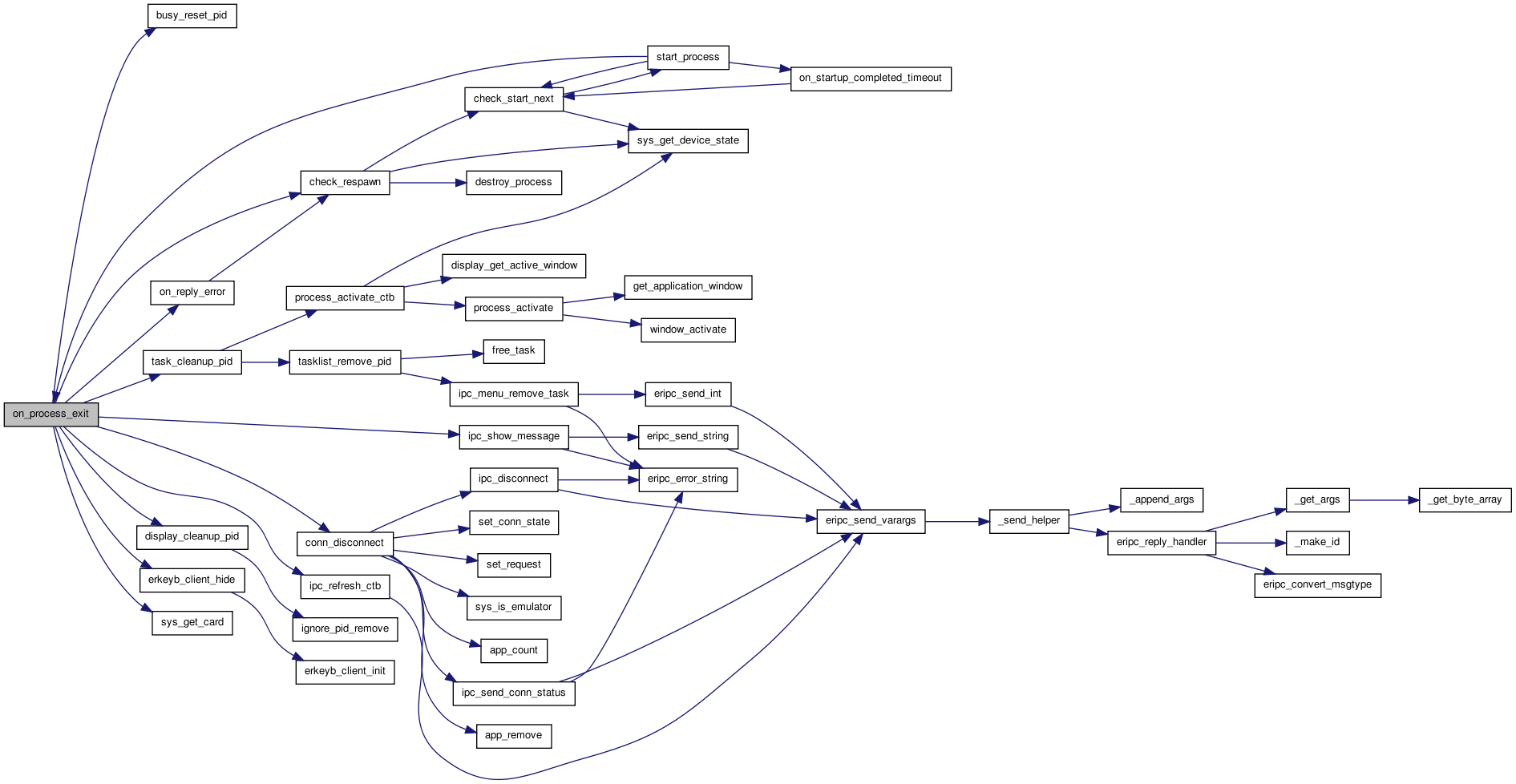

| static void on_reply_error | ( | eripc_context_t * | context, | |
| const eripc_event_info_t * | info, | |||
| void * | user_data | |||
| ) | [static] |
Definition at line 687 of file process.c.
References eripc_event_info_t::args, check_respawn(), ERIPC_EVENT_REPLY, ERIPC_TYPE_BOOL, eripc_event_info_t::event_type, LOGPRINTF, and WARNPRINTF.
Referenced by on_process_exit().
00690 { 00691 LOGPRINTF("entry"); 00692 00693 const eripc_arg_t *arg_array = info->args; 00694 00695 if (info->event_type != ERIPC_EVENT_REPLY) 00696 { 00697 WARNPRINTF("invalid event: %d", info->event_type); 00698 } 00699 else if ((arg_array == NULL) || (arg_array[0].type != ERIPC_TYPE_BOOL)) 00700 { 00701 WARNPRINTF("invalid arguments in reply"); 00702 } 00703 else 00704 { 00705 LOGPRINTF("User clicked ok"); 00706 proc_t *proc = user_data; 00707 check_respawn(proc); 00708 } 00709 }


| static gboolean on_startup_completed_timeout | ( | gpointer | data | ) | [static] |
Definition at line 527 of file process.c.
References check_start_next(), proc_t::command, g_process_pending_source, LOGPRINTF, proc_t::state, and STATE_RUNNING.
Referenced by start_process().
00528 { 00529 proc_t *proc = data; 00530 00531 LOGPRINTF("entry"); 00532 LOGPRINTF("timeout waiting for startupComplete (%s), new state STATE_RUNNING", proc->command); 00533 00534 // callback startupComplete not received, assume it is running 00535 proc->state = STATE_RUNNING; 00536 00537 // start next process 00538 check_start_next(); 00539 00540 g_process_pending_source = 0; 00541 00542 // stop and destroy this timer 00543 return FALSE; 00544 }
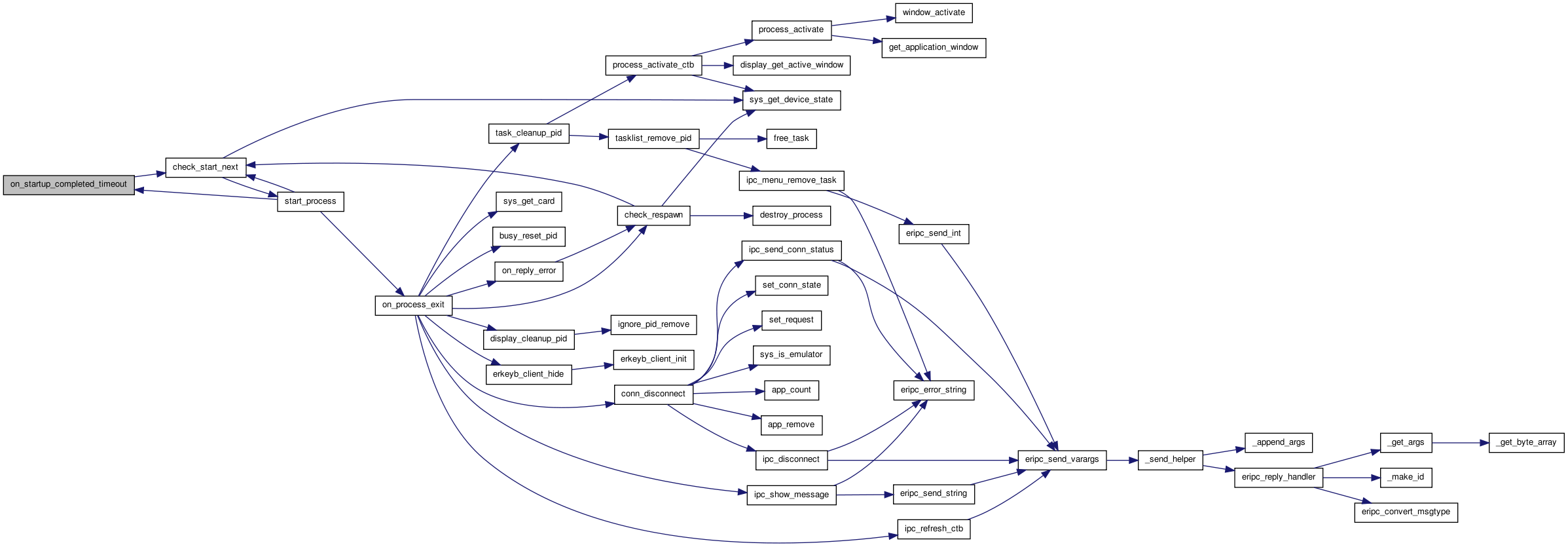

| static void post_process_startup | ( | proc_t * | proc, | |
| const char * | application, | |||
| gint | window | |||
| ) | [static] |
Definition at line 665 of file process.c.
References ipc_send_changed_locale(), ipc_send_volume_mounted_to(), proc_t::ipc_service, LOGPRINTF, MOUNTPOINT_CARD, STATE_CARD_MOUNTED, sys_get_card(), and task_startup_completed().
Referenced by process_startup_complete().
00666 { 00667 LOGPRINTF("entry"); 00668 00669 // inform tasks of new window 00670 task_startup_completed(proc, window); 00671 00672 // report mountpoint when card is available 00673 if (sys_get_card() == STATE_CARD_MOUNTED) 00674 { 00675 ipc_send_volume_mounted_to(proc->ipc_service, MOUNTPOINT_CARD); 00676 } 00677 00678 // report current language as it may have changed during startup 00679 const char *locale = g_getenv("LANG"); 00680 if (locale) 00681 { 00682 ipc_send_changed_locale(locale); 00683 } 00684 }


| void print_process_list | ( | ) |
Definition at line 272 of file process.c.
References proc_t::command, g_proclist, proc_t::ipc_service, proc_t::is_multidoc, and proc_t::pid.
Referenced by testing_list_tasks().
00273 { 00274 GSList *proc_ptr = g_proclist; 00275 00276 printf("%s() PROCESS LIST:\n", __func__); 00277 int i = 0; 00278 while (proc_ptr) 00279 { 00280 proc_t *cur = (proc_t *) proc_ptr->data; 00281 printf(" [%d] cmd=%s ipc=%s multi=%d pid=%d\n", i, 00282 cur->command, cur->ipc_service, cur->is_multidoc, cur->pid); 00283 00284 proc_ptr = proc_ptr->next; 00285 i++; 00286 } 00287 }

| gboolean process_activate | ( | const char * | application | ) |
Activate a running process (set to top).
---------------------------------------------------------------------------
Name : process_activate
- Parameters:
-
application Full path of the application
- Returns:
- Returns TRUE on success, FALSE on failure
--------------------------------------------------------------------------
Definition at line 149 of file process.c.
References get_application_window(), LOGPRINTF, WARNPRINTF, and window_activate().
Referenced by cb_menu_item_activated(), and process_activate_ctb().
00150 { 00151 LOGPRINTF("entry"); 00152 00153 gboolean result = FALSE; 00154 Window win_found; 00155 00156 win_found = get_application_window(application); 00157 00158 if (win_found != None) 00159 { 00160 window_activate(win_found); 00161 result = TRUE; 00162 } 00163 else 00164 { 00165 WARNPRINTF("No window found for: %s", application); 00166 } 00167 00168 return result; 00169 }


| gboolean process_activate_ctb | ( | void | ) |
Activate content browser (set to top).
---------------------------------------------------------------------------
Name : process_activate_ctb
- Parameters:
-
--
- Returns:
- Returns TRUE on success, FALSE on failure
--------------------------------------------------------------------------
Definition at line 172 of file process.c.
References display_get_active_window(), LOGPRINTF, process_activate(), STATE_DEVICE_STOPPING, and sys_get_device_state().
Referenced by task_activate_by_xid(), task_cleanup_pid(), and task_cleanup_window().
00173 { 00174 LOGPRINTF("entry"); 00175 00176 gboolean retval = TRUE; 00177 00178 if (sys_get_device_state() == STATE_DEVICE_STOPPING) 00179 { 00180 // don't activate CTB when device is shutting down 00181 return FALSE; 00182 } 00183 00184 // set to top when not already active 00185 gchar *app_active = display_get_active_window(); 00186 if (app_active && strcmp(app_active, "ctb") != 0 ) 00187 { 00188 retval = process_activate("ctb"); 00189 } 00190 00191 return retval; 00192 }


| gboolean process_add | ( | const char * | command, | |
| const char * | working_dir, | |||
| GCallback | startup_callback, | |||
| GCallback | exit_callback, | |||
| gint | flags | |||
| ) |
Add a process to the queue. The queue is served First In First Out.
---------------------------------------------------------------------------
Name : process_add
- Parameters:
-
application Full path of the application working_dir Working directory, or NULL to inherit parent's startup_callback Callback function when received startupCopmlete, or NULL exit_callback Callback function when processes was terminated, or NULL flags Bit field PS_WAIT_STARTED | PS_WAIT_EXIT | PS_RESPAWN
- Returns:
- Returns TRUE on success, FALSE on failure
--------------------------------------------------------------------------
Definition at line 97 of file process.c.
References check_start_next(), create_process(), and LOGPRINTF.
Referenced by main(), start_phase_2(), and start_phase_3().
00098 { 00099 LOGPRINTF("entry: %s, %d", command, flags); 00100 00101 proc_t *proc = create_process(command, working_dir, startup_callback, exit_callback, flags); 00102 if (proc == NULL) 00103 { 00104 return FALSE; 00105 } 00106 00107 check_start_next(); 00108 00109 return TRUE; 00110 }
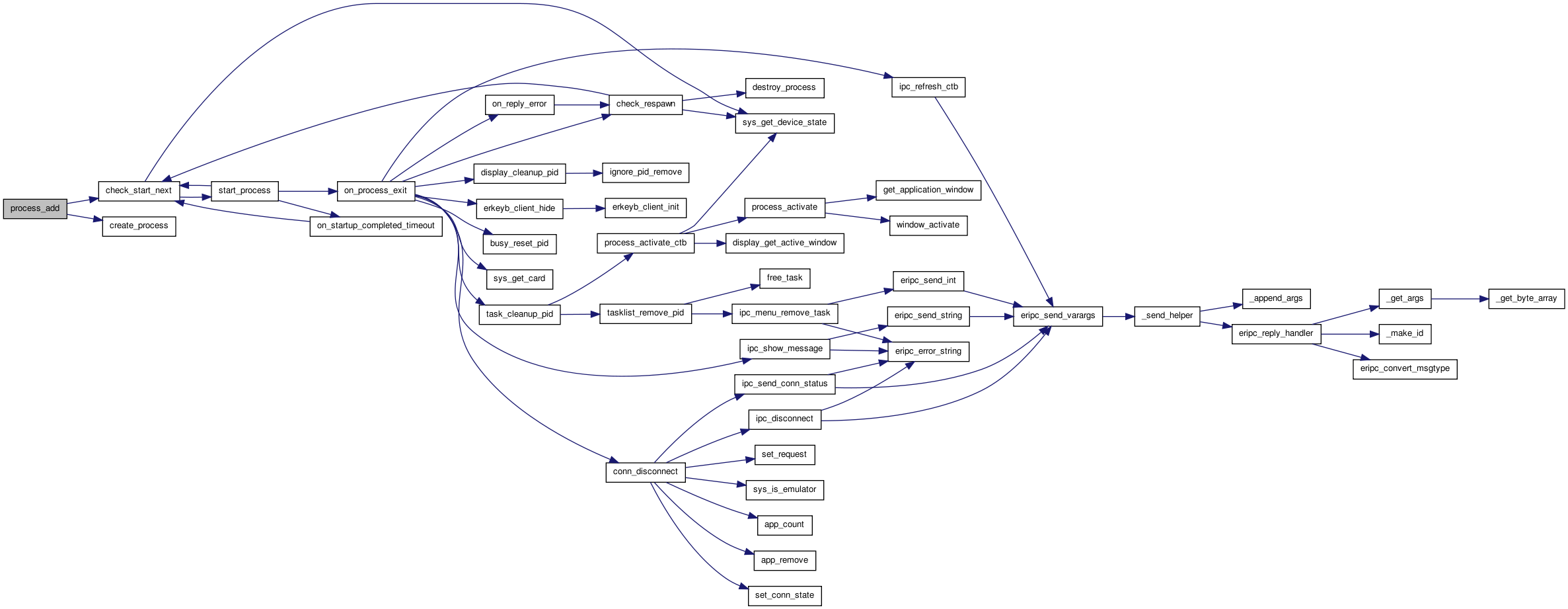

| proc_t* process_get_by_name | ( | const char * | application | ) |
Definition at line 290 of file process.c.
References proc_t::command, g_proclist, and LOGPRINTF.
Referenced by parse_wm_messages(), and task_start().
00291 { 00292 LOGPRINTF("entry [%s]", application); 00293 00294 GSList *proc_ptr = g_proclist; 00295 00296 while (proc_ptr) 00297 { 00298 proc_t *cur_proc = (proc_t *) proc_ptr->data; 00299 00300 gint argc = 0; 00301 char **argv_ptr = NULL; 00302 if (g_shell_parse_argv(cur_proc->command, &argc, &argv_ptr, NULL)) 00303 { 00304 gchar *proc_app = g_path_get_basename(argv_ptr[0]); 00305 // LOGPRINTF("check [%s]", proc_app); 00306 if (application && proc_app && (strcmp(proc_app, application) == 0)) 00307 { 00308 // LOGPRINTF("match [%s] pid [%d]", proc_app, cur_proc->pid); 00309 g_free(proc_app); 00310 return cur_proc; 00311 } 00312 g_free(proc_app); 00313 g_strfreev(argv_ptr); 00314 } 00315 proc_ptr = proc_ptr->next; 00316 } 00317 00318 return NULL; 00319 }

| proc_t* process_get_by_pid | ( | GPid | pid | ) |
Definition at line 248 of file process.c.
References proc_t::command, g_proclist, proc_t::ipc_service, LOGPRINTF, and proc_t::pid.
Referenced by process_startup_complete(), and task_add().
00249 { 00250 LOGPRINTF("entry pid [%d]", pid); 00251 00252 GSList *proc_ptr = g_proclist; 00253 proc_t *cur_proc = NULL; 00254 00255 while (proc_ptr) 00256 { 00257 cur_proc = (proc_t *) proc_ptr->data; 00258 00259 if (cur_proc->pid == pid) 00260 { 00261 LOGPRINTF("found [%p] command [%s] ipc service [%s]", cur_proc, cur_proc->command, cur_proc->ipc_service); 00262 return cur_proc; 00263 } 00264 00265 proc_ptr = proc_ptr->next; 00266 } 00267 00268 return NULL; 00269 }

| proc_t* process_start | ( | const char * | command, | |
| const char * | working_dir, | |||
| GCallback | startup_callback, | |||
| GCallback | exit_callback, | |||
| gint | flags | |||
| ) |
Start a process without queuing.
---------------------------------------------------------------------------
Name : process_start
- Parameters:
-
application Full path of the application working_dir Working directory, or NULL to inherit parent's startup_callback Callback function when received startupCopmlete, or NULL exit_callback Callback function when processes was terminated, or NULL flags Bit field PS_WAIT_STARTED | PS_RESPAWN
- Returns:
- Process created and started, or NULL on error.
--------------------------------------------------------------------------
Definition at line 113 of file process.c.
References create_process(), destroy_process(), LOGPRINTF, and start_process().
Referenced by child_new(), and start_medium().
00114 { 00115 LOGPRINTF("entry: %s, %d", command, flags); 00116 00117 gboolean result = FALSE; 00118 00119 proc_t *proc = create_process(command, working_dir, startup_callback, exit_callback, flags); 00120 if (proc == NULL) 00121 { 00122 return NULL; 00123 } 00124 00125 result = start_process(proc); 00126 if (result == FALSE) 00127 { 00128 LOGPRINTF("failed to spawn, remove from list"); 00129 destroy_process(proc); 00130 proc = NULL; 00131 } 00132 00133 return proc; 00134 }
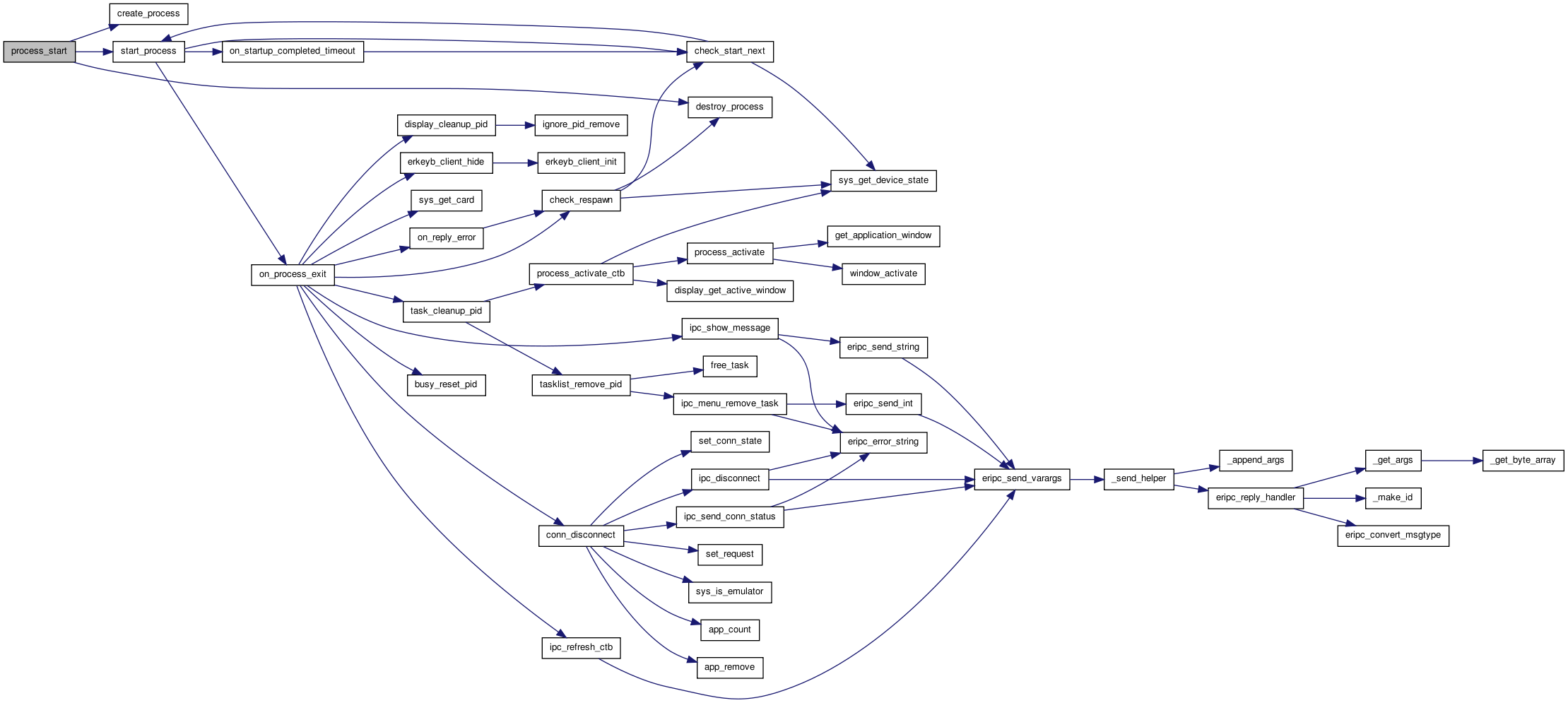

| gboolean process_startup_complete | ( | const char * | application, | |
| gint | pid, | |||
| gboolean | is_multidoc, | |||
| const char * | ipc_service, | |||
| gint | window | |||
| ) |
Call when application has finished starting.
---------------------------------------------------------------------------
Name : process_startup_complete
- Parameters:
-
application Full path of the application pid Process ud is_multidoc TRUE if multiple documents are supported, FALSE otherwise ipc_service IPC service window Window id
- Returns:
- Returns TRUE on success, FALSE on failure
--------------------------------------------------------------------------
Definition at line 195 of file process.c.
References check_start_next(), display_set_ctb_window(), g_process_pending_source, proc_t::ipc_service, proc_t::is_multidoc, LOGPRINTF, post_process_startup(), process_get_by_pid(), proc_t::startup_callback, proc_t::state, STATE_RUNNING, STATE_STARTING, and WARNPRINTF.
Referenced by cb_startup_complete().
00196 { 00197 LOGPRINTF("entry"); 00198 gboolean retval = FALSE; 00199 00200 // find proc by pid 00201 proc_t *proc = process_get_by_pid(pid); 00202 00203 if (proc == NULL) 00204 { 00205 WARNPRINTF("%s (pid %d) is not started sysd", application, pid); 00206 } 00207 else if (proc->state != STATE_STARTING) 00208 { 00209 WARNPRINTF("unexpected startupComplete received from %s (pid %d), state [%d]", application, pid, proc->state); 00210 } 00211 else 00212 { 00213 // stop pending timeout 00214 if (g_process_pending_source) 00215 { 00216 g_source_remove(g_process_pending_source); 00217 g_process_pending_source = 0; 00218 } 00219 00220 LOGPRINTF("received startupComplete from %s (pid %d, window %d), new state STATE_RUNNING", application, pid, window); 00221 if (strcmp(application, "ctb") == 0) { 00222 display_set_ctb_window(window); 00223 } 00224 00225 // update process info 00226 proc->state = STATE_RUNNING; 00227 proc->is_multidoc = is_multidoc; 00228 proc->ipc_service = g_strdup(ipc_service); 00229 00230 // do post startup actions 00231 post_process_startup(proc, application, window); 00232 00233 // call post startup callback 00234 if (proc->startup_callback) 00235 { 00236 (proc->startup_callback)(); 00237 } 00238 00239 // start next process 00240 check_start_next(); 00241 00242 retval = TRUE; 00243 } 00244 return retval; 00245 }
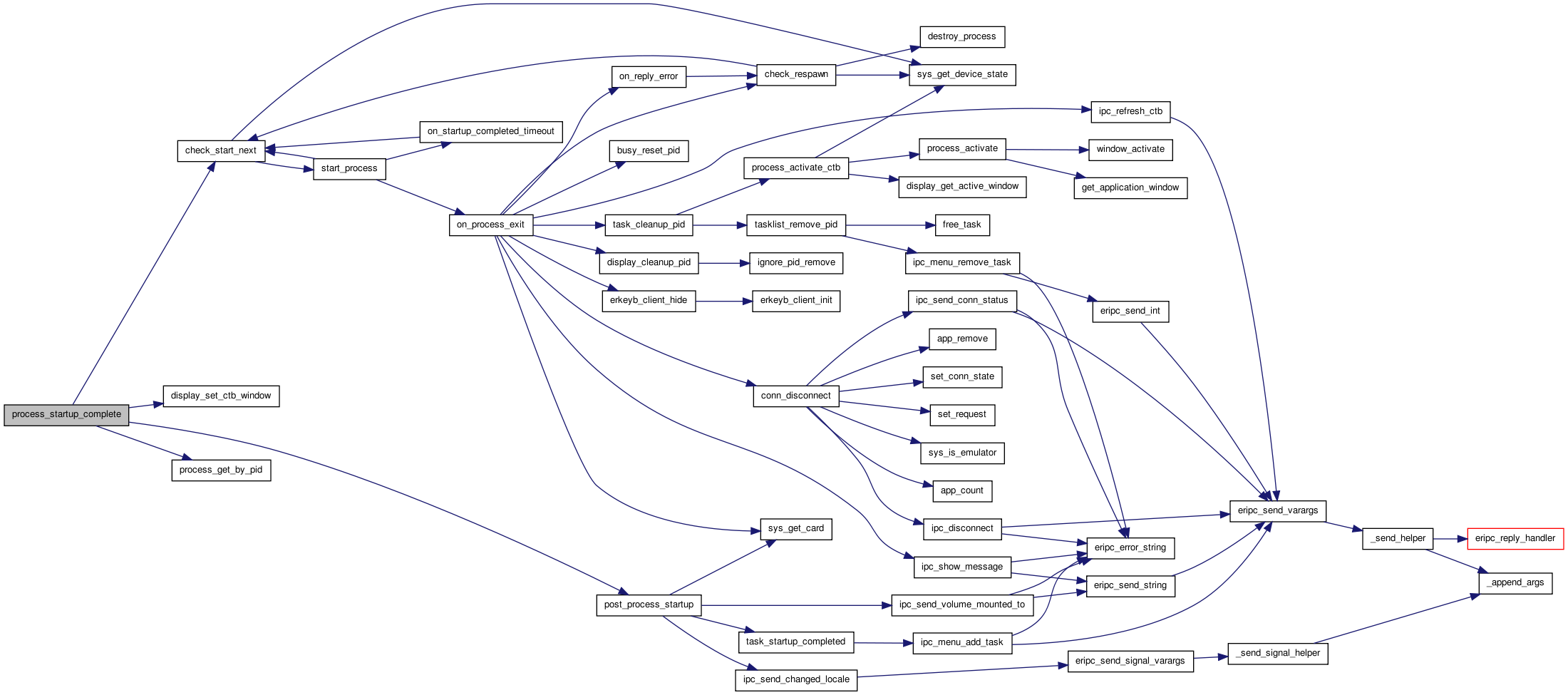

| void process_stop | ( | proc_t * | proc | ) |
Stop a running process.
---------------------------------------------------------------------------
Name : process_stop
- Parameters:
-
process The process to be stopped
- Returns:
- --
--------------------------------------------------------------------------
Definition at line 137 of file process.c.
References proc_t::command, LOGPRINTF, and proc_t::pid.
Referenced by stop_medium().
00138 { 00139 g_assert(proc); 00140 LOGPRINTF("entry: %s, %d", proc->command, proc->pid); 00141 00142 if (proc && proc->pid > 0) 00143 { 00144 kill(proc->pid, SIGTERM); 00145 } 00146 }

| static gboolean start_process | ( | proc_t * | proc | ) | [static] |
Definition at line 598 of file process.c.
References check_start_next(), proc_t::command, proc_t::flags, g_process_pending_source, LOGPRINTF, on_process_exit(), on_startup_completed_timeout(), proc_t::pid, PS_WAIT_EXIT, PS_WAIT_STARTED, proc_t::state, STATE_RUNNING, STATE_STARTING, TIMEOUT_STARTUP_COMPLETED, WARNPRINTF, and proc_t::working_dir.
Referenced by check_start_next(), and process_start().
00599 { 00600 LOGPRINTF("entry"); 00601 00602 GPid child_pid = 0; 00603 gint argc = 0; 00604 char **argv_ptr = NULL; 00605 gboolean retval = FALSE; 00606 GError *error = NULL; 00607 00608 LOGPRINTF("Starting: %s", proc->command); 00609 00610 retval = g_shell_parse_argv(proc->command, &argc, &argv_ptr, &error); 00611 if (error) 00612 { 00613 WARNPRINTF("Error parsing command '%s' failed with error: %s", proc->command, error->message); 00614 g_error_free(error); 00615 return FALSE; 00616 } 00617 00618 retval = g_spawn_async(proc->working_dir, argv_ptr, NULL, G_SPAWN_DO_NOT_REAP_CHILD, NULL, NULL, &child_pid, &error); 00619 if (error) 00620 { 00621 WARNPRINTF("Execution of '%s' failed with error: %s", proc->command, error->message); 00622 g_error_free(error); 00623 if (argv_ptr) g_strfreev(argv_ptr); 00624 return FALSE; 00625 } 00626 00627 if (proc->flags & PS_WAIT_STARTED) 00628 { 00629 if (g_process_pending_source) 00630 { 00631 g_source_remove(g_process_pending_source); 00632 WARNPRINTF("A process is started while a previous one was still pending. Previous pending timer stopped."); 00633 } 00634 00635 // set maximum time to wait for startupComplete 00636 g_process_pending_source = g_timeout_add_seconds(TIMEOUT_STARTUP_COMPLETED, on_startup_completed_timeout, proc); 00637 00638 // update process entry 00639 LOGPRINTF("wait for startupComplete (pid %d), new state STATE_STARTING", child_pid); 00640 proc->state = STATE_STARTING; 00641 proc->pid = child_pid; 00642 } 00643 else 00644 { 00645 // update process entry 00646 LOGPRINTF("don't wait for startup, new state STATE_RUNNING"); 00647 proc->state = STATE_RUNNING; 00648 proc->pid = child_pid; 00649 00650 if (!(proc->flags & PS_WAIT_EXIT)) 00651 { 00652 // start next process 00653 check_start_next(); 00654 } 00655 } 00656 00657 // watch child lifetime 00658 g_child_watch_add(child_pid, on_process_exit, proc); 00659 00660 g_strfreev(argv_ptr); 00661 return TRUE; 00662 }
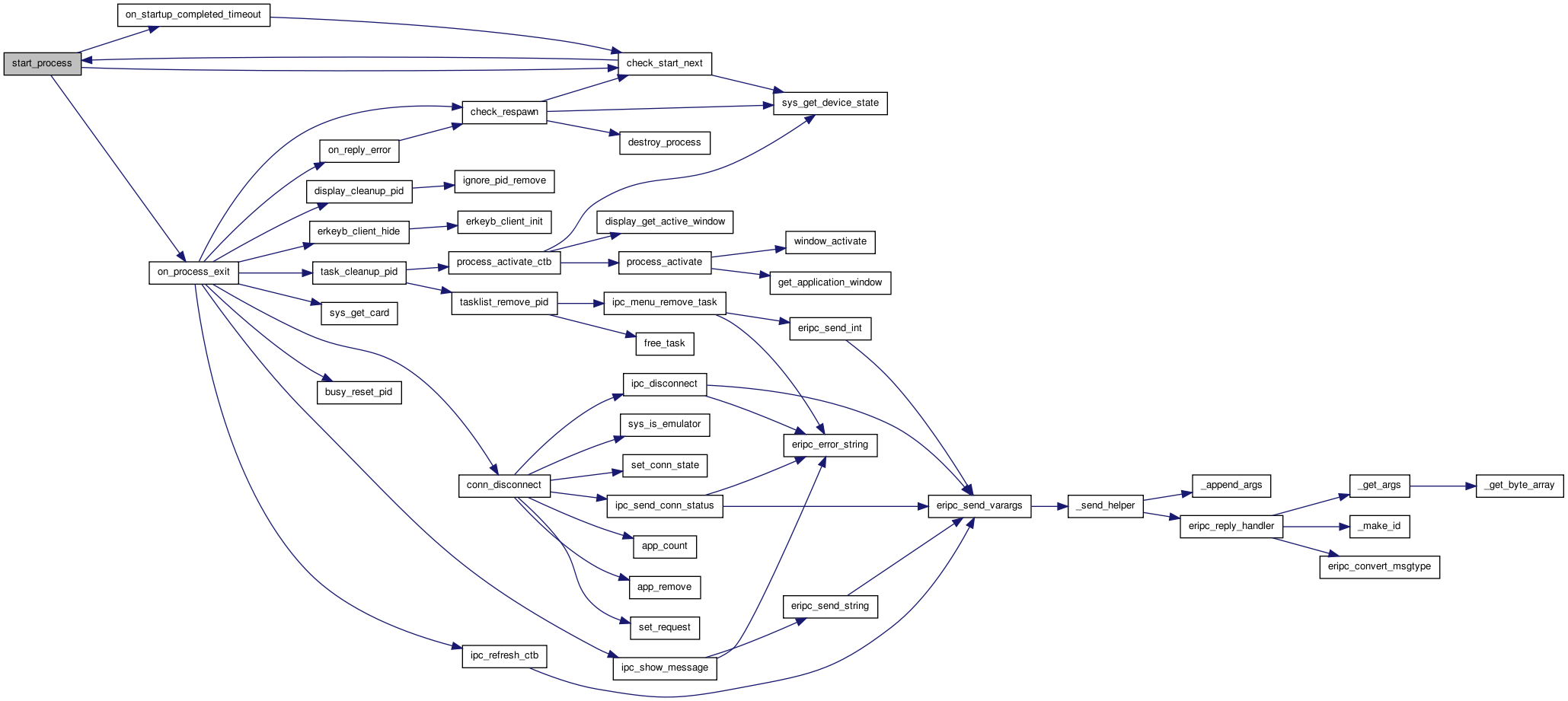

Variable Documentation
gint g_process_pending_source = 0 [static] |
Definition at line 75 of file process.c.
Referenced by on_process_exit(), on_startup_completed_timeout(), process_startup_complete(), and start_process().
GSList* g_proclist = NULL [static] |
Definition at line 74 of file process.c.
Referenced by check_start_next(), create_process(), destroy_process(), print_process_list(), process_get_by_name(), and process_get_by_pid().
const gint TIMEOUT_STARTUP_COMPLETED = 30 [static] |
Copyright (C) 2008 iRex Technologies B.V. All rights reserved.
Definition at line 67 of file process.c.
Referenced by start_process().
 1.6.2-20100208
1.6.2-20100208